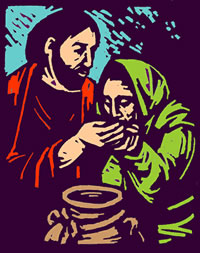
3rd Sunday of Lent Year A
We listen fascinated to the story of the meeting by the well of Jesus and the Samaritan woman. Her history reminds us of our own frailties; her finding of faith and a new life encourages us. Thirst and hunger are such elemental experiences that they come immediately to mind, as we try to express the restless quest that shapes every human life. Though her life’s searching has led her to make serious mistakes, we warm to the spirited woman from whom Jesus asks a drink. Jesus is thirsty; but what he seeks before all else is that this woman and those like her find true peace. In their memorable exchange he responds to the woman’s searching. As she comes to recognise that she has found what her heart has been seeking, she ‘puts down her water jar’, and runs off to share the good news with the villagers she has been avoiding – by coming to the well at midday when few people are about.
This narrative has been written for a community that has meditated deeply upon basic themes of Christian faith – themes as relevant for us today as they were when the gospel was written. The Saviour is progressively presented as the one in whom humanity’s long and troubled search will find what it has been looking for. He is ‘greater than Jacob’, the ancestor of Israel; he is not only ‘a prophet’; he is ‘the Christ’ of Israel’s hopes. In fact – as in many texts of John’s gospel – he intimates a claim to the divine name itself, ‘I AM he’.
His coming inaugurates a new order, ‘worship of the Father in Spirit and truth’ – something far beyond what has been known to Jews and Samaritans. He brings ‘living waters, welling up to eternal life’. John’s community would have heard in these words overtones of the wonder of their baptism.
The woman’s reaction to her enlightenment was a reminder to those who had found faith in Christ that they too were called to be missionaries. And this reminder has a sharp edge. It is not easy for us, today, to appreciate the bitterness of the estrangement between Jews and Samaritans – though the shocking conflicts of recent times may help us to understand the violent attitudes that divided these two groups. Of the Synoptic Gospels, Luke alone – the gentile convert - shows any sympathy for the Samaritans. A missionary outreach to these people, therefore, must have seemed almost unthinkable to early Christians, most of whom were from a Jewish background. The attitude of Jesus, and the success he had in this chance meeting with Samaritans, was an encouragement for them to take up the Church’s mission, even though the difficulties seemed insurmountable.
This lesson is hammered home for them - and for us - in the words of Jesus to his bewildered disciples: ‘My food is to do the will of the one who sent me’; the harvest is ‘ready’ – ‘grain for eternal life’. His final lesson is a call to humility – the saving plan he is inaugurating is God’s work – among God’s workers, ‘one sows, another reaps’
John Thornhill sm

